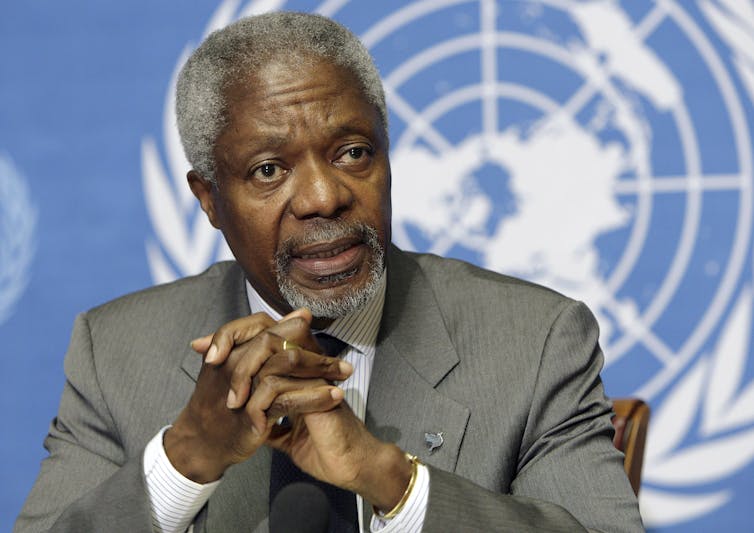Kofi Annan: a complicated legacy of impressive achievements, and some profound failure
By: Danny Bradlow, University of Pretoria

EPA-EFE/Martial Trezzini
Kofi Annan (80) was an important historical figure who played a critical role in many key events of the 1990s and 2000s. His death is therefore an opportunity to both celebrate his life and to begin honestly assessing his contributions to the world.
The Ghanaian diplomat’s legacy is complicated. He served as both head of the United Nations peacekeeping and as Secretary General of the UN. His tenure in these high offices – from 1992 to 2006 – were marked by great human tragedies as well as episodes of progress. His role in these events raises difficult questions about individual responsibility and the role of international organisations and their leaders in creating a more peaceful and just world.
On the plus side, his contributions were impressive. He was an effective diplomat, a shrewd negotiator and an intelligent strategist. He was such a successful bureaucratic operator that he was the first UN employee to rise to the position of Secretary General.
When he took over the organisation it was facing numerous challenges. They included a tense and often hostile relationship with its most powerful member state, the US, a difficult budgetary situation and what appeared to be an inability to fulfil its core peacekeeping, human rights and development functions.
By the end of his term, things looked very different. Relations with key member countries had been restored, the UN had a sound fiscal position and both he and the organisation had won the Nobel Peace Prize.
In addition, the organisation had launched some important new initiatives. It had adopted the Millenium Development Goals, which contributed to significant gains in health, education and human welfare in many countries around the world. The initiative was so successful that it was succeeded by the even more ambitious Sustainable Development Goals.
In addition, the international community had established the International Criminal Court and had begun prosecuting war criminals for their deeds in the wars in the former Yugoslavia and Rwanda.
He had also initiated the process of getting corporations to recognise and accept their responsibility for the environmental, social and human rights consequences of their activities. This process moved slowly. But his efforts ultimately led to the UN Human Rights Council unanimously endorsing the Guiding Principles on Business and Human Rights in 2011. These have now been incorporated into the human rights policies of many companies and have led to a number of countries adopting national action plans on the human rights responsibilities of business.
After he left the UN, Annan continued to do good work with both the Elders, a group of global leaders working for peace and human rights, and his own foundation. In these capacities he had some notable achievements. He helped resolve the post-election violence in Kenya, helped ensure peaceful elections in Nigeria and a number of other countries, and helped promote more productive and sustainable agriculture and good governance across Africa. He also tried, albeit unsuccessfully, to end the civil war in Syria and the campaign against the Rohingyas in Myanmar.
But there’s also a darker side to Annan’s record.
The tragedies
Annan was the head of UN Peacekeeping operations in the 1990s when two of the biggest failures in UN history happened. Under his watch both the Rwandan genocide and the massacres in Srebrenica took place.
In both cases his commanders on the ground requested authority to take stronger action to limit the risk of tragedy to those under their protection. In both cases he declined their request –with tragic results.
In addition, under his leadership UN peacekeepers in a range of countries, including Liberia, Sierra Leone and the Democratic Republic of Congo, were found to be sexually exploiting those they were charged to protect. The UN failed to respond promptly to these actions and they continued into the 2000s.
In most organisations, a leader who is responsible for such profound failures would be held accountable. If not fired, or forced to resign, they would at the very least be moved to a position of lesser authority. But this didn’t happen because the UN has poor mechanisms and a weak culture of accountability. In fact, the UN and its member states, decided to promote Annan, selecting him to replace the first African Secretary General, Boutros Boutros Ghali, who was deemed to be too independent minded by the US.
Annan continued relying on the UN’s lack of accountability once he was in office. His son was implicated in the infamously corrupt food-for-oil programme that was initiated to help the Iraqi population during the period of sanctions against Saddam Hussein.
Eventually, under pressure, he appointed the independent Volcker Commission to investigate the programme. It concluded that, although Annan himself was not guilty of any wrong doing, his actions in response to the abuses were inadequate, including that he had failed to refer the matter to the UN’s independent watchdog agency.
He also tolerated sexual harassment within the UN Secretariat, protecting the former head of the UN refugee agency when he was accused of sexual harassment, penalising his accuser and then relying on the UN’s legal immunity to avoid having to respond to her efforts to seek justice. The adverse publicity eventually forced the guilty official to resign.
Lessons to be drawn
There is no doubt that running a complex international institution like the UN is difficult and requires leaders who are willing to compromise. Given the Secretary General’s weak position, it may also be inevitable that its leaders will have to turn a blind eye to some acts and omissions that have tragic and possibly evil consequences in order to advance higher priorities.
Annan showed throughout his career that he was a master at playing this game. As a result, his record includes both some impressive achievements and some profound failures. It will be up to history to decide if he made the right choices and struck the correct balance between doing good and tolerating evil.
![]()
In the meanwhile, we should all draw lessons from the life of this important historical figure about the importance of holding leaders and the institutions that govern our world accountable for their actions and decisions.
Danny Bradlow, SARCHI Professor of International Development Law and African Economic Relations, University of Pretoria
This article was originally published on The Conversation. Read the original article.
Written by: Natasha
Similar posts
MORE ARTICLES

SA Lotto + Lotto Plus Results for tonight: Wednesday, 02 July 2025

WATCH: Actress, Noxolo Dlamini on starring in the Sarafina play & testing moments as a creative

WATCH: Standard Bank Young Artist Award Winner Modise Sekgothe on Kaya 959 for Youth Week Takeover

Elsa Majimbo on how much she misses living in SA – ‘I miss everything, even the crime’

WATCH: Standard Bank Young Artist Award Winner Muneyi on Kaya 959 for Youth Week Takeover
QUICK LINKS
UpComing Shows

959 Music Weekdays
Kaya 959 Hits
Real. Familiar. Memorable. Kaya 959 brings you the music you know and love from our playlist. Uninterrupted. Thursdays 20h00 to 21h00
close
The Best T in the City
With T Bose
He has held it down in the world of mid-morning radio with the best music, riveting topics, brilliant mixes and interesting guests. Every weekday, The Best T proves why he is the BEST by connecting to you like only your bro or favourite uncle could. He lets his listeners dictate the songs they want to hear in the ever-popular Top 10 at 10, and his Three Teaspoons never run out. Catch The Best T in the City Mondays to Fridays from 09h00 to 12h00.
close
Feel Good
With Andy Maqondwana
Feel good about feeling good! That's exactly what The Feel-Good show is about. An escape from the negativity that surrounds us, indulging you in good feels. Pass it on to one and all. Spread the good feeling around Gauteng with Andy Maqondwana.
close
Kaya Biz
With Gugulethu Mfuphi
The world of business is simplified for you by Kaya Biz with Gugulethu Mfuphi. This fast-paced award-winning business show talks to the corporate giants as well as up and coming entrepreneurs about their wins and challenges. Gugulethu invites guests to offer their analyses of markets and economies, and also delves into issues of personal financial wellness. Kaya Biz airs Mondays to Thursdays 18h00 to 19h00.
close
Point of View
With Phemelo Motene
Point of View with Phemelo Motene delves into the day’s current affairs, touches on real issues that affect people’s daily lives and shares expert advice on questions posed by the audience. Mondays to Thursdays 20:00 to 22:00.
closeConnect with Kaya 959
DownLoad Our Mobile App
© 2025 Kaya 959 | On The Street On The Air










